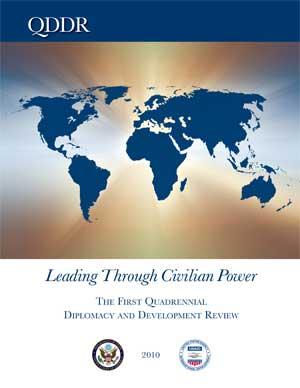The Quadrennial Diplomacy and Development Review (QDDR)
After Secretary of State Hillary Clinton introduced the QDDR as a major step in elevating development alongside diplomacy as a key pillar of American foreign policy, many non-governmental organizations (NGOs) welcomed the QDDR as the beginning of a better coordinated and more effective approach to global development. USIP and Webster University will host a day of discussion about how the QDDR complements NGO efforts in development, humanitarian relief and conflict management as well as the current challenges and opportunities that result from the QDDR.

After Secretary of State Hillary Clinton introduced the QDDR as a major step in elevating development alongside diplomacy as a key pillar of American foreign policy, many non-governmental organizations (NGOs) welcomed the QDDR as the beginning of a better coordinated and more effective approach to global development. USIP and Webster University hosted a day of discussion about how the QDDR complements NGO efforts in development, humanitarian relief and conflict management as well as the current challenges and opportunities that result from the QDDR.
This discussion was built around presentations from senior United States government officials from the Department of State and U.S. Agency for International Development and from leaders in the NGO community. These were followed by panel discussions that combine the perspectives of policymakers and NGOs on the topics of economic development, public health, education, human security, and human rights.
USIP was among the organizations that contributed ideas to the development of the QDDR, particularly in the areas of stabilization and conflict prevention. Discussion of the QDDR and its goals will enhance the effectiveness of both NGOs and the U.S. Government in global development and conflict prevention efforts, particularly in building local capacity and promoting innovation.
-
What in the QDDR is relevant to the work of NGOs and private voluntary organizations (PVOs)?
-
How will the objectives of the QDDR affect NGOs and PVOs?
-
Where is there complementarity in the following areas?
- Conflict Prevention
- Capacity building
- Development of effective civil society
- Humanitarian aid
- Contributions of new technology
Download Conference Agenda
Speakers
-
Nancy Lindborg
Assistant Administrator, USAID -
Melanie Greenberg
President and CEO, Alliance for Peacebuilding -
Joel Charny
Vice President, Interaction -
Ambassador Robert Loftis
Former Acting Coordinator for Reconstruction and Stabilization, the Department of State -
David Wilson
Dean of Humanities, Webster University -
David McKeanDirector of the QDDR Office, Department of State
-
Jeff Helsing
Dean of Curriculum, U.S. Institute of Peace
Explore Further
-
USIP's QDDR Overview event information and video



